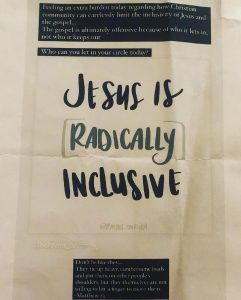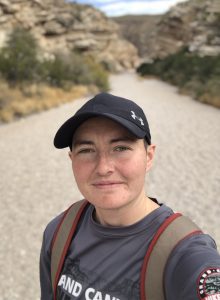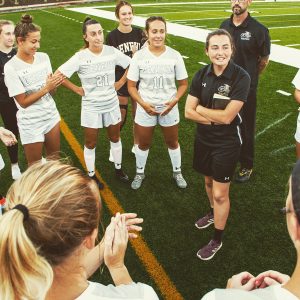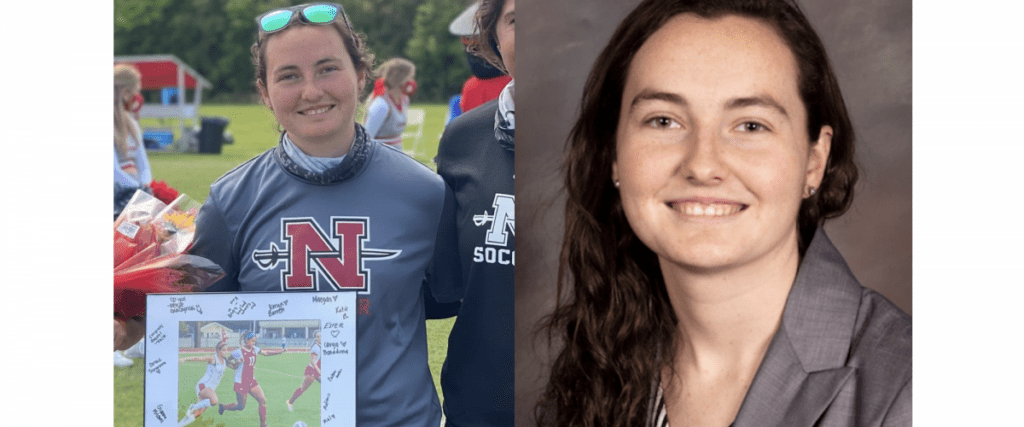On June 2, soccer coach Kelsey Morrison was fired and immediately escorted from the campus of Geneva College, an evangelical school near Pittsburgh. Her offense was two posts on Instagram.

In this exclusive interview with me for Baptist News Global, Coach Morrison tells her story. This interview has been edited for clarity and brevity.
Q: So, Kelsey, how long were you at Geneva College? And in what role?
A: I was there for two years as their head women’s soccer coach.
Q: Where had you been before?
A: I was an assistant coach at Nicholls State University in South Louisiana. I moved up to the Pittsburgh area for the job at Geneva.
Q: How did your team do in your two years as a coach?
A: We were taking over a team that had not been competitively successful before. We were able to see a lot of growth in our first season as we made the conference playoffs for the first time in program history, which was wonderful. A big drive was recruiting. We were seeing a full roster and seeing that grow. So the momentum was shifting.
Q: When you were hired, what were the stipulations related to LGBTQ issues, like a code of conduct or anything that would have been relevant to what ultimately happened with you?
A: Geneva, as a Christian institution, requires their staff and faculty to submit a personal statement of faith. And then, along with that, there’s a code of conduct for the staff and faculty which goes through primary things that you would expect working at a Christian institution. It talks about a non-affirming stance on homosexuality and that you won’t promote participating in that “lifestyle.” And so that was something I had to have a really firm grasp on before accepting the job. But I was in a place in my own convictions where I could commit to singleness. I could commit to hold to the code of conduct the college has, and so I went forward with accepting the position.

Kelsey Morrison
Q: So the code of conduct says you’re not supposed to promote or participate in homosexuality? Is that what the language is?
A: It was: We believe marriage is between a man and a woman and anything outside that is against biblical standards. So we do not agree with same-sex marriage, sexual relations outside of heterosexual marriage.
Q: And a lifestyle requirement not to practice in opposition to that statement. Right?
A: Yeah.
Q: When you went to Geneva, if I can ask you, where were you in your sense of gender and sexual identity?
A: Growing up in a Christian home, and having faith in Christ myself, there’s always been some challenges in that area. So it was something I was very, very private about and had struggled with. In terms of behavior, I held to similar convictions to that of the college, so that for me, I don’t believe a same-sex sexual relationship is what Jesus has for me. And I’m OK with that. I get to journey through what it means to have really rich community outside of that.
And so that’s kind of where I was. Back in Louisiana, being at a state institution, I kind of lacked and didn’t really know how to build that kind of community at the time. And so I was looking forward to working at a Christian college where I knew there’d be a little bit more innate Christian community around me. In Louisiana, I was a little bit more open about my sexuality. I thought, now I’m going to have to not do that. I’m going to need to not tell anyone. I was wrestling through some of those things. That was my thought process.
Q: So you had accepted an identity as gay or lesbian. But you were going to be Side B (nonpracticing, celibate) in your lifestyle. Right?
A: That’s very much what I hold to. Yeah.

Coach Kelsey Morrison with her team at Geneva College (photo provided by Kelsey Morrison)
Q: Did I gather from your writings that you sent me there had been something that happened last year, and not just this year? Was there some event or something? Can you tell me about that?
A: Last August, I had a player go to my assistant coach and ask him, “Hey, is Coach gay?” And he suggested that she come talk to me. I knew I needed to have a conversation. And so that same day I met up with her, and we sat down for about 30 minutes. I said, “Hey, you know this is a tough piece of my journey to share openly because it’s nuanced, and some people struggle with that. But it’s also not something that I hide. This is an experience that I have. I’m happy to talk about it if it is helpful to discuss.”
It was like a big, scary thing, because I was like, “Oh, crap! I’m going to get fired.” And so I called my athletic director and asked to meet with him the next day because it may be a conversation point that happens. I wanted that conversation to come from me, because up to that point, I hadn’t talked about it at all. I met with him the next day and said, “Hey, a player asked me about this. I told them something that was very in line with our statement of faith. And you know this is what I hold to.”
He accepted that input and said he needed to meet with the president of the college. And so he ended up meeting with the president and the dean of students and gave me a call the next day and said, “It’s OK, keep doing your job.”
Q: So, was the idea that you had not violated the code because you were not doing anything you weren’t supposed to be doing, and you were not promoting, you were just engaging the student with the support she needed?
A; Yes, I told them I believe what Geneva holds to, but this is part of my story. I am more unique than some here, but I am staying within the policy. The next day I was told, keep doing your job, and so it never came up again, and I just kept doing the work.
“I am more unique than some here, but I am staying within the policy.”
Q: You were responding with what the student needed, but that honesty was risky for you.
A: Yeah, I didn’t feel there was anything else I could do. She asked a question. You know, I was going to speak on it, and then it was very nerve-wracking, and so I knew I needed to speak with my boss. It never came up again. So we just kept doing what we were doing.
Q: The events that led to your loss of your job — was it entirely due to two Instagram posts, the one saying “Queer people offer precious gifts to the church,” and the other saying, “Jesus is radically inclusive”?
A: That’s the entirety of it. Those two posts were put in front of me when I went into HR.
Q: Why did you share these online? It seems like you were taking a risk when you did that.
A: First and foremost, my Instagram’s a little bit personal. Obviously, anything you can put out into the world is less personal than one would think. But I don’t have students or families or people like that from Geneva on my private Instagram. But I do have a lot of people who know that’s something I’m really passionate about, and I think that really matters a lot.
I want those people to know they have value in a church setting and offer gifts to the body of Christ. Was there a risk? Yes. I probably did think about it at the time. But I still would say those things. I think there’s probably a different platform for it, which is why it can be easily misconstrued. But I think anyone who sat down for 20 minutes would be like, “Oh, yeah, your people do offer value to the church.”

Q: Because what you’re saying is, there’s a group of human beings. They are of value in God’s sight. And maybe they have some unique life experiences they could share. And that is not about what people do sexually. That appears to have been a distinction lost on your school as they fired you. Would you like to say anything about that experience?
A: Yeah, it was really challenging. I think it could go back to just a language barrier issue. And I think that’s what’s really difficult. I understand the difficulty in interpreting it. But they know I am queer, so to say anything different would be me saying I know I don’t offer value to the church. And I don’t think they would say that to me. And so it’s just an interpretation issue. So when I was called in I was trying to have that conversation, and we just weren’t able to get through.
I was wondering why wasn’t there maybe a warning, like a conversation of, ‘Hey, please don’t share this on your private Instagram. We feel it can be misinterpreted.’ I just want to know why no one spoke to me about this issue. When we met in HR, it was probably about a month and a half after I had shared those Instagram stories. So it had been a long time. And there just wasn’t the ability to talk to anyone else, and no one has talked to me since then.
“I knew the situation was really wrong, so I knew it wasn’t for me to sign that form.”
Q: So this was termination at once, no severance, no nothing.
A: There was an offer. If I signed an NDA (nondisclosure agreement) I would get three months’ severance. I think, unfortunately, money is not that alluring to me. I just couldn’t bear it. People were misinterpreting why I was fired, there were rumors going around. Also, I just have a really strong conviction that queer people do add value to these settings. And I knew the situation was really wrong, so I knew it wasn’t for me to sign that form.
Q: Tell me about the impact of this on you and what your next steps are.
A: Probably the biggest thing was like a huge emotional impact. I lost relationship with 30 student athletes who I got to invest in daily. I have really wonderful community in Pittsburgh, and having to consider that I’ll probably need to move to find another coaching job is hard. Then there’s the reputation piece. It took me a little bit to digest and decide if I wanted to keep coaching. But I feel that’s really where a lot of impact is and something I love. So just finding a new opportunity.
“I think there was a loss there because of fear that people could get confused and think Geneva likes gay people.”
Q: Do you believe Geneva College violated its own policies? Do you believe you would have a legal case if you wanted to pursue a legal venue?
A: I definitely worked through this as well. I did talk to a lawyer. But it’s hard to talk to a lawyer while you’re looking for health insurance, while you’re looking for a job, while you’re trying to remain emotionally together. I’m undecided. I do think if they took 20 minutes to sit down and talk, they would see that even for their student body experience, it’s wonderful to have special minorities on campus that can speak to that experience. But I think there was a loss there because of fear that people could get confused and think Geneva likes gay people.
Q: Has this had an impact on your faith in Jesus, or are you able to separate that from this experience?
A: I’m really thankful because even in the turmoil and in the challenge of the last two years, I’ve actually met and loved people who love Jesus in a really wonderful way. I am super connected at my church and with some people who know me and love me really well. And so it’s actually been interesting, because it was kind of easy to separate the two. I was clear: that’s not Jesus.
Q: So in in a sense, then. because you’re able to make that separation, it doesn’t have to be a faith crisis. It’s an employment crisis. But it doesn’t have to be a faith crisis.
A: Yeah, it was a crisis, because it was really hard. I mean, I’m deeply passionate about my job. But it was not like, oh, Jesus doesn’t care for me.
Q: Is there anything that you would say to Geneva College right now?
A: I would love it if Geneva College would do a training with some organizations that hold a traditional sexual ethic but train people in how to care for LGBTQ people. Because I’m afraid people are getting hurt. I’ve had dozens of current Geneva students, former Geneva students reach out to me and say, “Hey, I have left the faith. I was really hurt. But I appreciate your story.”
* * *
Comment: I ask readers to be precise in understanding what happened here. Kelsey Morrison identifies as gay/queer but believes it is God’s will that she not be in a same-sex sexual relationship. She does insist, however, that the lives of queer people be honored as having value and as offering gifts to the church.
This is simply a proper expression of the Christian moral conviction that all lives are sacred. She also believes Jesus includes queer people within the range of his love. This is simply a proper expression of the essential gospel conviction that Jesus’ love includes everyone.
For saying these things online, in what she thought was a private Instagram story, she was fired and escorted from the campus of Geneva College.
Notice that Coach Morrison made herself vulnerable because a student need required it. Those of us in Christian higher education surely can identify. A student needed a mentor who might understand and identify with her struggle. The conversation the student sought required authenticity on the part of the mentor. That authenticity was risky for Kelsey Morrison, but she felt she had no choice but to offer it. She is to be applauded for being there for her student with vulnerability and authenticity.
Traditionalist Christian institutions like to say they are simply trying to hold the line for biblical sexual morality. But what their decisions often communicate is what Kelsey Morrison was forced to conclude here: They just don’t like gay people and don’t want them in their communities.
“Including LGBTQ people is not about sexual morality.”
Sexual morality is about what we do in sexual relationships. Including LGBTQ people is not about sexual morality. It is about whether this smallish part of the human community is allowed to be a part of the Christian community. That’s not sexual ethics; it’s bigotry.
While, thanks be to God, Kelsey Morrison has not lost her faith in Jesus despite this mistreatment experienced at the hands of Christians, many queer people and those who care about them have indeed left the faith because of this behavior. Anti-LGBTQ Christianity is one of the greatest forces contributing to the loss of Christian faith and affiliation in our culture today. As Kelsey Morrison says, “That’s not Jesus.” No, it’s not.
In response to my request for comment, Geneva College offered the following statement:
Geneva College is a Christ-centered academic community that provides a comprehensive education to equip students for faithful and fruitful service to God and neighbor.
Geneva’s biblical views and missional commitments are expressed in the Westminster Confession of Faith, Westminster Catechisms, the Testimony of the Reformed Presbyterian Church of North America (RPCNA), and various policies and documents adopted by the Synod of the RPCNA and by the college itself. At the same time, the college understands that different perspectives exist in other faith communities.
In order to maintain its religious character and identity, the college draws its workforce from among those who are willing to model and annually reaffirm their commitment to the truths captured in these documents. The college reserves the right to take appropriate action, up to and including separation from employment, if an employee engages in behavior or expression that contradicts or undermines these views.
I leave it to the reader to decide which party, Geneva College or Coach Kelsey Morrison, better reflects the way and spirit of Jesus Christ.
Editor’s note: Geneva College played a role in the 2016 U.S. Supreme Court case about employee insurance coverage of “abortion-inducing drugs.” The college sued the federal government to avoid being required to provide such medication coverage.
This article first appeared in Baptist News Global.

